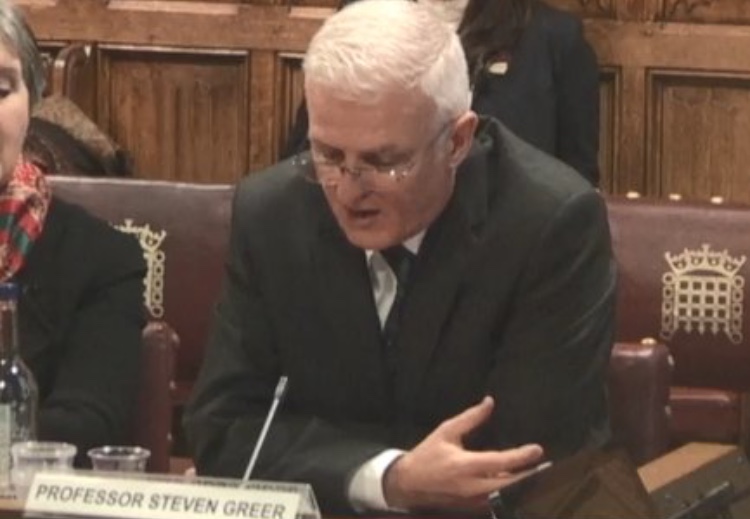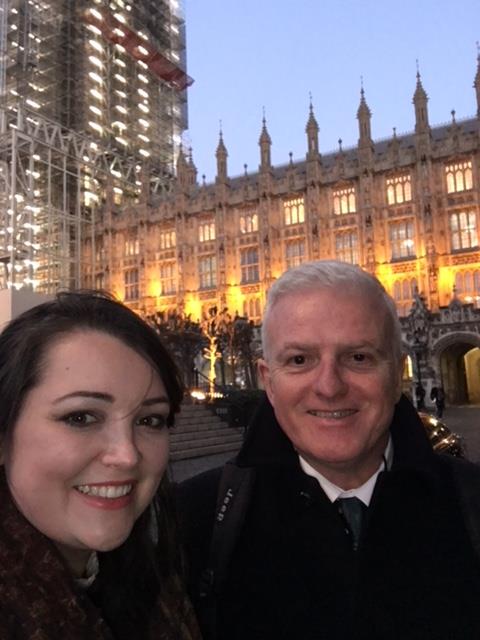Most people in the UK know that, in addition to passing legislation, the activities of parliament include rumbustious debates in the House of Commons and sharp exchanges at Prime Minister’s question time. But probably few realise that committees of various kinds also play a vital and largely invisible role, including by conducting inquiries into matters of public interest to which politicians and others may make submissions.
One of the most high-profile – with representation from across the political spectrum in Commons and Lords including ‘cross bench’ peers not affiliated to any party – is the 12-member Joint Committee on Human Rights (JCHR). At the end of 2017, and the beginning of 2018, it conducted an inquiry into Freedom of Speech in Universities embracing controversial issues such as ‘no platforming’, ‘safe spaces’ and the counter-terrorist Prevent duty.
*Having submitted a recently-published article** to it, we were invited to attend a hearing on 17 January 2018 (but only one of us was permitted to appear on the panel) and given an indication of the likely questions. ***Although interesting the proceedings proved less than wholly satisfactory for two reasons. First, they lacked any clear structure and instead consisted of very specific questions posed, collectively or individually, to the four witnesses. While this is understandably designed to discourage long, rambling speeches, it tended to militate against the systematic presentation of any given case. Second, they had to be cut short because of important votes on the Brexit bill, clearly beyond the Committee’s control. However, to compensate, the four witnesses were invited to make further written submissions. We publish ours here.
In our view the key to any informed and responsible debate about freedom of speech/expression lies in the acknowledgement of three essentials. It is, first, a fundamental human right and a
key component of a democratic state and society. But, second, since it is not absolute, it is quite properly subject to various restrictions and limits especially where it conflicts with other fundamental human rights and pressing public interests. Third, the key tests provided by international human rights law are that any limitation should comply with the rule of law and be necessary in a democratic necessity, and in particular be proportionate to the legitimate aim pursued as supported by reliable and convincing evidence. The central issue we sought to address in our supplementary evidence concerned what, in relation to the Greer and Bell study, student radicalization, and the allegedly chilling effect of the Prevent duty in universities, counts as ‘reliable and convincing evidence’.
We’ve been asked more than once in the context of the JCHR inquiry about the methods used in our Public Law article. In the first place we were motivated to conduct the research by concern that much of the criticism and speculation about the likely effects of the Prevent duty in universities were, and are, based on myths, misunderstanding, misinformation, misrepresentation and muddled thinking. Second, our primary objective was to explain what the Prevent duty is and what, in the wider constitutional and legal context, it requires. Third, we also sought to illustrate how the duty is being implemented by universities. Given limited resources – our study was not funded by a research grant – we were only able to conduct interviews with relevant officials in three universities, Bristol, Royal Holloway and East London. We would also have liked to interview other interested parties but they declined to cooperate. Three universities is, of course, far from a scientifically representative sample. But because the broad characteristics of the practice we describe have been confirmed as common throughout the sector by the Prevent-compliance officer at the Higher Education and Funding Council for England (HEFCE) – since reconstituted as the Office for Students (OS) – they nevertheless provide valid and useful illustrations.
The principal conclusions of our study are first that neither the Prevent duty nor the relevant legislation violates human rights nor do they have any of the other negative characteristics alleged by the anti-Prevent movement. Second, there is no credible, systematic evidence that either the legislation or the duty has been implemented in universities in a manner which violates human rights or which has any of the other negative characteristics alleged by the anti-Prevent movement. Some anecdotes to this effect are in circulation. But on closer inspection these have all turned out so far to be either aberrant departures from the norm, or based on factually erroneous rumour. Third, there are legitimate concerns about the inclusion of non-violent extremism in the Prevent agenda.
On several grounds we strongly contest the claim that ‘there is no evidence that students have been drawn into terrorism (‘radicalized’) at British universities’. First, it is simply not true. There is, in fact, plenty of evidence that students have been drawn into terrorism while at university and that some British universities have been unwitting breeding grounds for it.4 Second, we are also concerned about how a confusing red herring – the distinction between students being ‘radicalized’ while at university and on campus – has been introduced to the debate. In our view this is both a distinction without a difference and one which is, in any case, irrelevant to the Prevent duty. While all well-informed sources accept that there is no single, straightforward route into jihadi terrorism, the various influences – such a radical preachers and mosques, social media, NGOs and student activities – are permeable, interconnected and cannot be easily separated.
But this is not the issue which matters most. The key question is what universities should be required by law to do if they discover evidence of radicalization wherever it has originated. The Andrew Ibrahim case, cited in our study, presents a particularly graphic illustration of a near-fatal system failure in this regard, albeit in an FE college rather than a university. A parallel with other vulnerabilities to which students are exposed should also be noted. It would, for example, be a gross dereliction of duty for a university to be unconcerned about the vulnerability of a particular student to suicide merely because the risk stemmed from a source – eg family, personal relationships, long-term mental ill-health, or substance abuse – other than from their studies or student life. Why, then should vulnerability to being drawn into terrorism, which may in any case also manifest in suicide, be any different?
Nor can universities be exempt from the responsibility to contribute to the prevention of crime, including terrorism, because this is a universal democratic obligation. If they were to be exempt from the Prevent duty, as some advocate, it would be an open invitation to terrorists to step up their attempts to recruit from these sources knowing they would be immune from official intervention.
Finally, a pervasive myth in the campaign against the Prevent duty is that it has a ‘chilling effect’ on debate in universities. Two examples typically given are that events which might have gone ahead are no longer even contemplated, and that students who wish to study or to express views about controversial issues are deterred from doing so fearful of being referred to a de-radicalization programme.
But there are two problems with these claims. The first is that, although there is some anecdotal evidence to support them, there is no credible, systematic evidence that they are true. Second, they amount to a curious self-fulfilling prophecy because they stem, not from the Prevent duty itself, but from the mythology which has arisen about it. Universities cannot refer anyone to a de-radicalization programme. Nor can they lawfully refer anyone to the local authority Prevent process – which may result in referral for deradicalization – merely for the expression of ‘radical’ or ‘unorthodox’ views. There must also be evidence of a risk of harm to themselves or others. Furthermore, nobody can be referred for de-radicalization without their consent and it is not an offence to decline to give it. Nor do any other obvious consequences flow from the failure to do so.
While counter-terrorism may pose challenges for freedom of expression in universities to which there are no easy solutions, the law, nevertheless, provides a relatively clear process. However, the myths about the Prevent duty, which have sown misunderstanding and misinformation, urgently need to be contested. The JCHR has a key role to play here. There is also a need for systematic authoritative information to be provided about the impact of the Prevent duty in higher education. And who better to do so than the Office for Students? Although the OS may have a legitimate regulatory role it would make a hugely welcome contribution if, as far as the Prevent duty is concerned, it only collected systematic data about its impact.

